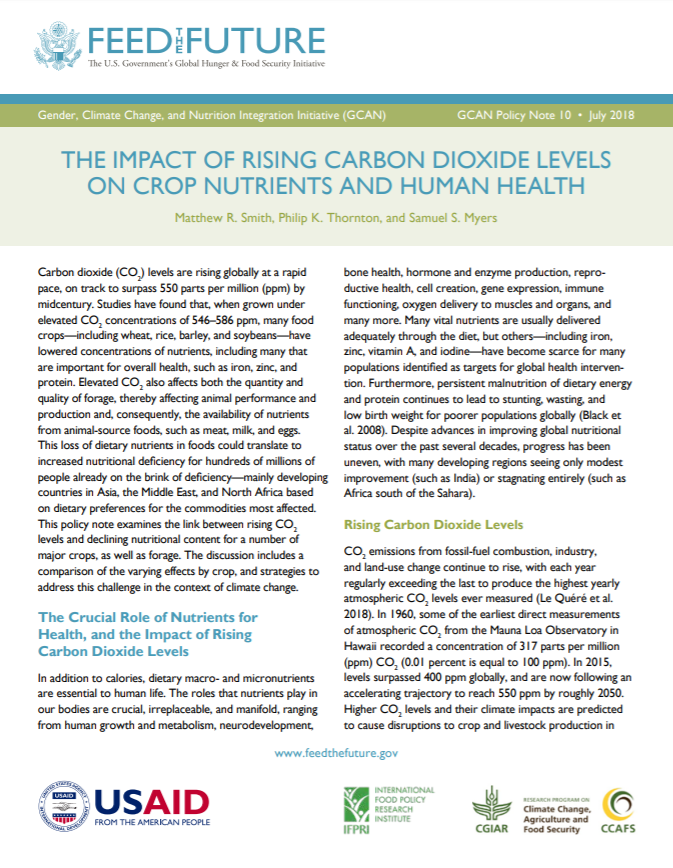How climate change impacts the concentration of key nutrients in crops

New policy note examines the link between rising CO2 levels and declining nutritional content for major crops.
Since the Industrial Revolution, the atmospheric concentration of CO2 has been rising inexorably. CO2 emissions come from activities like deforestation and the burning of fossil fuels.
Policy note: The impact of rising carbon dioxide levels on crop nutrients and human health
On average, people around the world receive most of their nutrition from plants, including 63 percent of total dietary protein, 68 percent of zinc, and 81 percent of iron. Because so many people in the world get their nutrition from plants, and because plants are uniquely affected by higher CO2 concentrations, it is likely that large parts of the world would consume less protein, iron, and zinc coming from crops in 2050 unless significant measures are taken to counteract nutrient leaching.
This loss of dietary nutrients in foods could translate to increased nutritional deficiency for hundreds of millions of people already on the brink of deficiency—mainly those living in developing countries in Asia, the Middle East, and North Africa, based on dietary preferences for the crops most affected.
Results from other studies indicated that, in 2050, the number of people at risk of zinc deficiency globally could increase by 138 million, and the number at risk of protein deficiency globally could increase by 148 million. Importantly, regions that are most at risk from the link between rising CO2 levels and lower crop nutrients would be best served by heightened monitoring of both public health and crop nutrition.
How to address the challenges
Countries have many ways to act to protect themselves now. For some crops, breeding programs could choose cultivars based on reduced CO2 sensitivity alongside other typically beneficial characteristics, such as high yields, heat tolerance, and drought and pest resistance. Many international organizations are actively working to create crop breeds with higher overall micronutrient contents, which would also work to offset these declines in nutrient density if adopted in regions that need them. The CGIAR Research Program on Climate Change, Agriculture and Food Security (CCAFS), through one of its learning platforms, is starting to work with several CGIAR centres on ex ante analyses around climate- and nutrition-smart breeding.
Despite the work undertaken so far, many pieces of this story remain unclear. The trajectory of future global CO2 emissions, changes in dietary habits, and the response of global food systems to climate change remain largely unknown in forecasts of the global health costs of rising CO2 levels in terms of crop nutrition. Each of the systems involved are complex, difficult to predict, and interdependent, which makes any effort to increase their precision challenging. Nevertheless, there are many avenues of research that could shed light on this issue and begin the process of crafting ways to avoid some of the worst effects.
Increased direct monitoring of both food intake and micronutrient status, globally, would help to improve targeting of any future interventions to the most vulnerable populations. New developments in CGIAR in household data collection protocols and big data analytics should be able to contribute here. Finally, breeding programs may cultivate beneficial characteristics, such as resistance to CO2-related leaching, and higher micronutrient content, to provide dietary remedies to this effect.
Download the policy note: The impact of rising carbon dioxide levels on crop nutrients and human health
The policy note was prepared under the Gender, Climate Change, and Nutrition Integration Initiative (GCAN). GCAN was made possible with support from Feed the Future through the U.S. Agency for International Development (USAID) and is associated with the CGIAR Research Program on Climate Change, Agriculture and Food Security, which is carried out with support from CGIAR Fund Donors and through bilateral funding agreements.
The policy note has not been peer-reviewed. Any opinions are those of the authors and do not necessarily reflect the views of the International Food Policy Research Institute (IFPRI), USAID, or Feed the Future.
Matthew R. Smith and Samuel S. Myers are employed at the Harvard T. H. Chan School of Public Health, Boston, Massachusetts, USA. Philip K. Thornton is the Priorities and Policies on CSA Flagship Leader at CCAFS.
Edited by Lili Szilagyi, Communications Consultant at the CCAFS Priorities and Policies on CSA Flagship.




